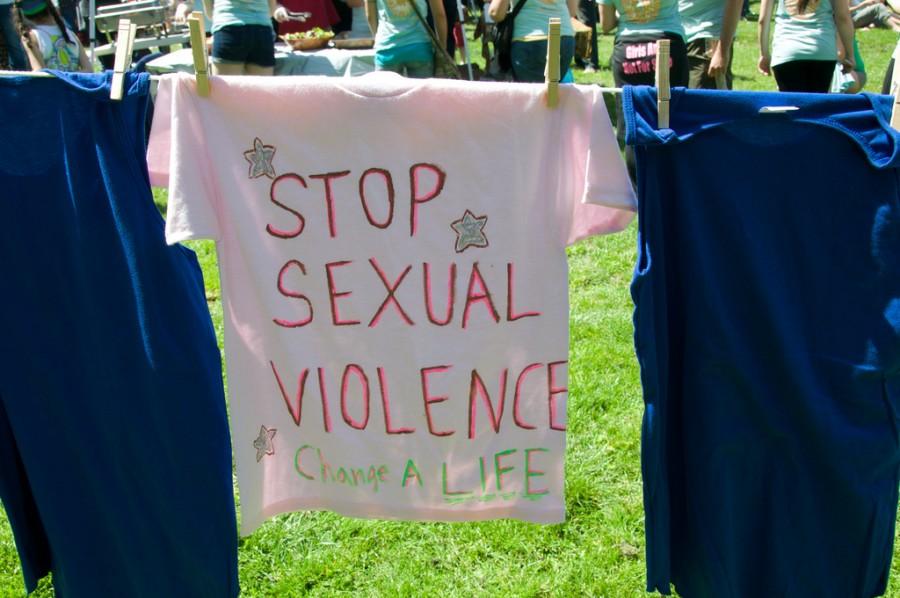Sexual assault awareness garners renewed attention
With students beginning to speak out on sexual assault, measures have been introduced to ensure the rapid decline of this traumatic crime
A clothesline at a Walk Against Rape event in San Francisco displays this shirt imploring the cessation of sexual violence. Sexual assault is an extremely controversial topic and many people do not understand or acknowledge the full, traumatic impact it can have on someone who has experienced it.
June 13, 2015
In April 2014, the first report from the White House Task Force to Protect Students from Sexual Assault was released. It began with this stomach-turning statement: one in five college students experience an incident of sexual assault during their college career.
According to researchers at Wayne State University, more than half of sexual assaults committed against college students involve alcohol.
Furthermore, collegedrinkingprovention.gov states that 97,000 students between the ages of 18 and 24 are victims of alcohol-related sexual assault or date rape.
In late April, Bud Light – a beer regularly consumed by college students all over the world – released new bottles with a label that promised that their beer was “the perfect beer for removing ‘no’ from your vocabulary for the night.” Needless to say, the new bottles engendered controversy.
Whether students are walking across campus at night, at a party on the weekend, or sitting in their dorm on a Tuesday night, the issue of sexual assault is surrounding them. Considering how prevalent sexual assault is on a college campus, it seems a bit odd that it is not a topic pushed more regularly.
“Students could make such a positive change,” Alesha Durfee, associate professor and graduate director (lowercase titles that follow a name) of Women and Gender Studies at Arizona State University, said.
Durfee is in charge of Arizona State University’s Clothesline Project – a project organized by students to raise awareness about sexual assault.
The project page states that it is a vehicle for women affected by violence to express their emotions by decorating a shirt. They then hang the shirt on a clothesline to be viewed by others as a testimony to the problem of violence against women.
“What’s really incredible to me is the diversity of people becoming involved,” Durfee said. “If you look at the people who stop and make conversation or make shirts, they’re very different than who I would have expected to stop five years ago. It’s reaching a different audience. I think these are always people who cared about sexual assault, and who were always aware – but they weren’t always active in the movement. I think it’s really exciting that now people are getting involved.”
With the help of Durfee and those involved in the Clothesline Project, the issue of sexual assault is being addressed at ASU, but not all universities have made these important strides.
“There are some universities who are more responsive right now than others,” Durfee said. “I think the actions of the federal government have made universities become more aware of the problem, and also the complexities of the problem.”
As sexual assault begins to be addressed more commonly, the terms of what is considered sexual assault and where it is occurring have broadened.
“I think when we used to talk about sexual assault on college campuses, students were told to ‘carry your keys, loop them through your fingers, don’t walk home from the library home alone,’” Durfee said. “Then it shifted to ‘Oh, it’s just fraternities and frat parties.’ Now, I think there’s a growing awareness among university administrators that this is a much larger problem than just that.”
According to Strickland, no sexual assault cases have been reported on the SCC campus since 2011. The four-year streak is undoubtedly one the school would like to see expand to 40 years or 140 years.
The Public Safety office at SCC offers a service to escort students to their car if they feel that their safety is at risk, Strickland said.
“The university can’t be everywhere,” SCC Public Safety commander Les Strickland said. “You can’t be at the apartment complexes that border the campus. You can’t be in the dorm rooms at all times, but they try.”
Although being a victim of sexual assault can have a very traumatizing effect on a person, the amount of people willing to talk about it now compared to those speaking out 10 to 20 years ago has increased greatly, Durfee said. People are getting more proactive.
As sexual assault becomes a topic more college students are willing to talk about, the statistic one out of five may shrink. It is up to the students to keep the conversation going.


